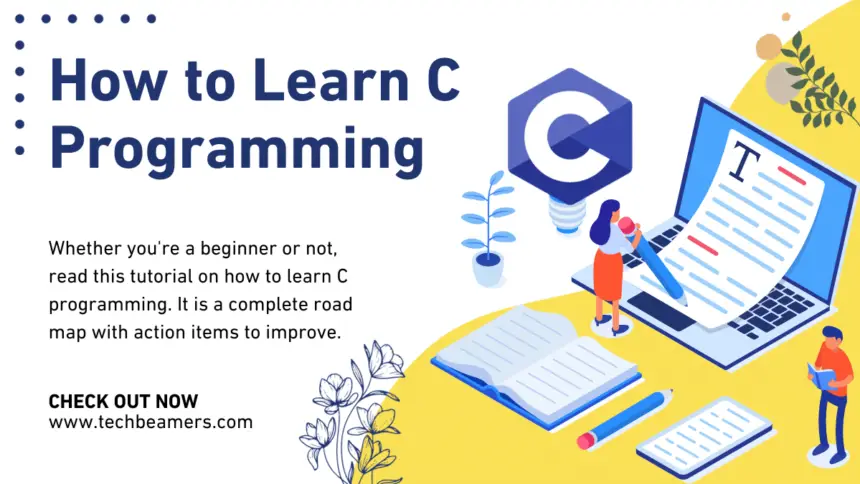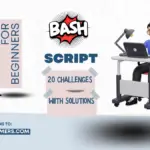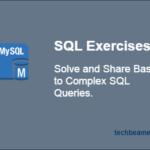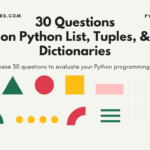This tutorial puts together the steps you should take to know: How to learn C programming. Learning C is an exciting journey that opens the door to the world of computer science and software development. Whether you are a beginner or have some programming experience, this tutorial will guide you through the essential aspects of learning C.
How to Learn C Programming
In this tutorial, we’ll cover various methods, techniques, and resources to help you grasp the fundamentals and advance your C coding skills.
1. Understanding the Basics
Before diving into coding, it’s crucial to understand the basics of C programming. Familiarize yourself with the following concepts:
1.1 Variables and Data Types
In C, variables are containers for storing data. Learn about different data types such as int, float, char, and double. Here’s an example:
#include <stdio.h>
int main() {
int age = 25;
float height = 5.9;
char grade = 'A';
printf("Age: %d\nHeight: %.2f\nGrade: %c\n", age, height, grade);
return 0;
}1.2 Control Flow
Understand how to control the flow of your program using C if statements, loops, and switch cases:
#include <stdio.h>
int main() {
int num = 10;
if (num > 0) {
printf("Positive number\n");
} else if (num < 0) {
printf("Negative number\n");
} else {
printf("Zero\n");
}
for (int i = 0; i < 5; i++) {
printf("%d ", i);
}
while (num > 0) {
printf("%d ", num);
num--;
}
return 0;
}1.3 Functions
Learn how to define and use functions for modular and reusable code:
#include <stdio.h>
// Function declaration
int add(int a, int b) {
return a + b;
}
int main() {
int result = add(5, 3);
printf("Sum: %d\n", result);
return 0;
}2. Interactive Learning Platforms
Interactive platforms offer hands-on coding experiences, making you learn C programming engaging and effective. Platforms like Codecademy, HackerRank, and LeetCode provide a structured approach to learning.
2.1 Codecademy
Codecademy’s interactive C course lets you write code directly in your browser. It covers the basics and gradually introduces more complex topics. The instant feedback and interactive exercises make learning enjoyable.
2.2 HackerRank
HackerRank offers a variety of C programming challenges. Solve real-world problems, participate in contests, and practice your skills. The platform also provides discussions and editorial solutions, allowing you to learn from others.
2.3 LeetCode
LeetCode is a platform known for its algorithmic challenges. While it’s not exclusive to C, many problems can be solved using C. It’s an excellent resource to enhance your problem-solving skills and algorithmic thinking.
3. Books for In-Depth Knowledge
Books are timeless companions in your learning journey. Consider the following classics and beginner-friendly books. This is how many of us learn C programming.
3.1 “C Programming Absolute Beginner’s Guide (3rd Edition)” by Perry and Miller
This book is beginner-friendly, providing a gentle introduction to C programming. It covers fundamental concepts with clear explanations and practical examples.
3.2 “The C Programming Language” by Kernighan and Ritchie
Known as the “K&R” book, this is a must-read for any C programmer. It provides in-depth insights into the language and is often considered the Bible of C programming.
3.3 “C Programming for the Absolute Beginner, Second Edition” by Vine
If you’re an absolute beginner, this book is a great starting point. It introduces C in a way that’s easy to understand, with hands-on examples and exercises.
4. Online Tutorials and Video Courses
Video tutorials can be a dynamic way to learn C programming, especially for those who prefer a visual and auditory learning style. Platforms like Udemy and Coursera offer C programming courses.
4.1 Udemy – “C Programming For Beginners – Master the C Language”
This course covers C programming from the basics to more advanced topics. It includes practical examples, quizzes, and projects to reinforce your learning.
4.2 Coursera – “Programming for Everybody (Getting Started with Python)” by the University of Michigan
While this course primarily focuses on Python, understanding programming concepts is language-agnostic. It’s a great way to learn programming fundamentals, which can then be applied to C.
5. Practice, Practice, Practice
Programming is a skill best learned through practice. Leverage coding platforms, such as GitHub, to collaborate on projects and build a portfolio.
5.1 GitHub
Contribute to open-source projects or start your own. GitHub provides an excellent platform for version control and collaboration. It’s also a showcase for potential employers to see your coding skills.
5.2 Personal Projects
Create small projects to apply your knowledge. For example, develop a simple calculator, a to-do list app, or a basic text-based game. These projects not only reinforce your skills but also serve as valuable additions to your portfolio.
6. Engage with the Community
Joining an online C community gets you access to learn C programming from others. Seek help when needed, and stay motivated. Platforms like Stack Overflow, Reddit (r/C_Programming), and Discord have active communities.
6.1 Stack Overflow
Ask questions, answer queries, and participate in discussions. Stack Overflow is a goldmine of programming knowledge. Before asking a question, make sure to search for existing answers.
6.2 Reddit – r/C_Programming
This subreddit is dedicated to C programming. It’s an excellent place to share your progress, seek advice, and learn from experienced programmers.
6.3 Discord
Join C programming Discord servers to engage in real-time discussions. Discord provides a more interactive and immediate way to connect with fellow learners and experts.
7. Compiler and IDE
Choose a suitable compiler and integrated development environment (IDE) for writing, compiling, and debugging your C code.
7.1 GCC (GNU Compiler Collection)
GCC is a powerful compiler for C programming. It’s widely used and available on multiple platforms. Install it on your system and use it to compile your C programs from the command line.
7.2 Code::Blocks
Code::Blocks is a user-friendly IDE that supports multiple compilers, including GCC. It provides a visual interface for coding, compiling, and debugging. Additionally, it’s cross-platform, making it accessible for Windows, Linux, and macOS users.
8. Debugging Skills
Learning how to debug your code is essential for identifying and fixing errors. It is one of the core steps you need to learn C programming.
8.1 gdb (GNU Debugger)
Gdb is a powerful debugger that allows you to step through your code, set breakpoints, and inspect variables. Familiarize yourself with basic gdb commands to troubleshoot your programs effectively.
gcc -g -o my_program my_program.c
gdb ./my_program8.2 IDE Debugging Tools
Most modern IDEs, including Code::
Blocks, come with built-in debugging tools. Learn how to use breakpoints, watch variables, and step through your code within the IDE.
9. Understanding Memory Management
C programming requires a good understanding of memory management to avoid memory leaks and undefined behavior.
9.1 Pointers and Dynamic Memory Allocation
Master the concept of pointers and dynamic memory allocation. Understand when and how to use functions like malloc and free to manage memory dynamically.
#include <stdio.h>
#include <stdlib.h>
int main() {
int* dynamicArray = (int*)malloc(5 * sizeof(int));
// Use dynamicArray...
free(dynamicArray); // Release allocated memory
return 0;
}9.2 Memory Leaks and Valgrind
Learn to use tools like Valgrind to detect memory leaks and other memory-related issues in your programs.
valgrind ./my_program10. Advanced Topics
Once you are comfortable with the basics, explore advanced topics to deepen your understanding of C. It would be a major milestone in your journey to learn C programming.
10.1 Data Structures and Algorithms
Study data structures (e.g., linked lists, trees) and algorithms to enhance your problem-solving skills. Implement common algorithms in C and analyze their time and space complexity.
10.2 File Handling
Learn how to read from and write to files in C. Understanding file handling is crucial for working with external data and storing information persistently.
#include <stdio.h>
int main() {
FILE* file = fopen("example.txt", "w");
fprintf(file, "Hello, C Programming!");
fclose(file);
return 0;
}10.3 Multithreading
Explore the basics of multithreading in C for concurrent programming. Learn how to create and manage threads using libraries like pthread.
#include <stdio.h>
#include <pthread.h>
void* threadFunction(void* arg) {
printf("Hello from the thread!\n");
return NULL;
}
int main() {
pthread_t myThread;
pthread_create(&myThread, NULL, threadFunction, NULL);
pthread_join(myThread, NULL);
return 0;
}Certainly! Let’s add some more useful information to further enhance the tutorial.
11. Version Control with Git
Even if you learn C programming syntax and functions, it won’t make you a complete programmer. Understanding version control is essential for collaboration and tracking changes in your codebase.
11.1 Git Basics
Learn the basics of Git for version control. Familiarize yourself with commands like git init, git add, git commit, and git push. Platforms like GitHub and GitLab offer hosting for your Git repositories.
git init
git add .
git commit -m "Initial commit"
git remote add origin <repository_url>
git push -u origin master11.2 GitHub Features
Explore GitHub features such as branching, pull requests, and issues. These features facilitate collaboration and make it easier to contribute to open-source projects.
11.3 Git Workflow
Understand common Git workflows like the feature branch workflow and Gitflow. These workflows help manage changes in larger projects and teams effectively.
12. Coding Standards and Best Practices
Adopting coding standards and best practices ensures consistency and readability in your code.
12.1 Naming Conventions
Follow established naming conventions for variables, functions, and files. For example, use camelCase for variables and functions in C.
int myVariable;
void myFunction() {
// Code here
}12.2 Commenting
Practice good commenting habits to explain complex sections of your code. However, aim for self-explanatory code whenever possible.
// This function adds two numbers
int add(int a, int b) {
return a + b;
}12.3 Code Reviews
Participate in and conduct code reviews. Code reviews provide valuable feedback, improve code quality, and help you learn from others.
12.4 Code Linters
Use code linters to automatically analyze your code for potential issues and enforce coding standards. Tools like clang-format can help maintain a consistent code style.
clang-format -i my_code.c13. Continuous Learning
Technology evolves, and continuous learning is key to staying relevant and mastering C programming.
13.1 Online Courses and Webinars
Enroll in advanced C programming courses or attend webinars to stay updated on the latest features and best practices.
13.2 Conferences and Meetups
Participate in programming conferences and local meetups. Networking with professionals and enthusiasts provides valuable insights and inspiration.
13.3 Blogs and Newsletters
Follow programming blogs and subscribe to newsletters to stay informed about the latest trends, updates, and programming techniques.
14. Building a Portfolio
A well-structured portfolio showcases your skills and projects, making it easier for potential employers to assess your abilities.
14.1 GitHub Portfolio
Create a GitHub repository dedicated to showcasing your projects. Include a README file with project descriptions, screenshots, and links to live demos.
14.2 Personal Website
Consider building a personal website to present your portfolio, share your journey, and highlight your achievements. Platforms like GitHub Pages or Netlify make it easy to host a static website.
15. Real-World Application
Apply your C programming skills to real-world scenarios and projects.
15.1 Open-Source Contributions
Contribute to open-source projects relevant to your interests. It’s a great way to collaborate with experienced developers and enhance your skills.
15.2 Internships and Freelancing
Explore internship opportunities or freelancing projects. Practical experience in real-world scenarios adds significant value to your learning.
Conclusion
By incorporating version control, coding standards, continuous learning, and building a portfolio into your learning journey, you not only master C programming but also develop a holistic skill set that is highly valuable in the software development industry. Embrace these additional aspects to become a well-rounded and proficient C programmer. Happy coding!
Conclusion
Learning C programming is a rewarding endeavor that lays a solid foundation for various programming languages. Approach it systematically, practice regularly, and engage with the programming community. By mastering the fundamentals, exploring advanced topics, and building real-world projects, you’ll become a proficient C programmer ready to tackle more complex challenges in the world of software development.









